Have you ever wondered how sites appear at the top of Google’s search results? That's where the power of SEO comes into action!
Let's start with the basics. SEO, or Search Engine Optimization, helps websites climb to the top of rankings. It's all about making your website more visible and attractive to search engines so they'll rank it higher when people search for relevant topics.
Here's how it works: search engines use complex algorithms to analyze and rank billions of websites based on various factors. These factors include things like:
- Keywords (the words and phrases people type into the search bar);
- The relevance and quality of your content;
- The speed and UX of your website;
- The number of other websites linking to yours (backlinks).
By optimizing your website for these factors, you can improve your chances of ranking higher in search results, which means more traffic and visibility for your site.
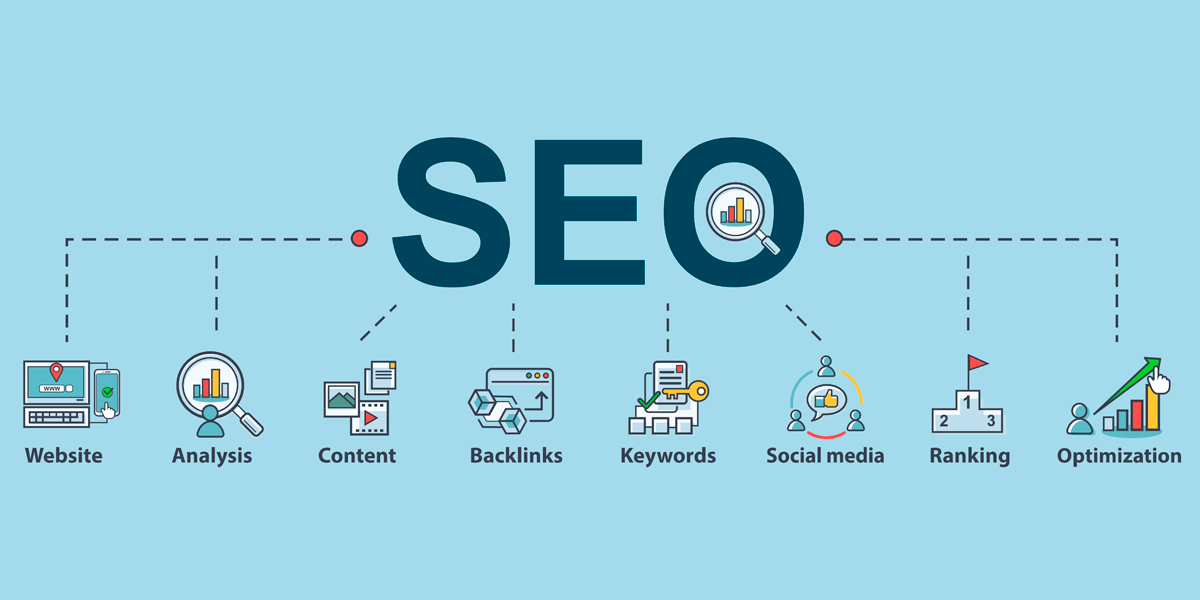
Image source: Advesa.com
Though initially it sounds easy, SEO is dynamic, constantly adjusting to changes. You must have heard about Google’s algorithms, which are regularly updated, not to mention that user behaviors are evolving non-stop. What was effective yesterday may not work today. That's why staying updated with the latest SEO trends is crucial to remain competitive and succeed in your marketing efforts.
Future of SEO
SEO has always been important for online marketing and pitching a product as it helps you get seen and relevant on the web. As things and people change, SEO evolves, bringing new strategies and techniques. So, ensuring high website impressions is a key aspect of modern SEO, emphasizing visibility, engagement, and conversion.
The Journey of SEO: Evolution from the Beginning
Search engines started way back in the early days of the internet, with sites like Yahoo! and AltaVista. They used basic algorithms to decide which websites were the best, how often keywords appeared, and what meta tags were used. However, as the internet evolved, these search engines couldn't keep up and needed to improve. That's when Google came along and brought in PageRank, which looked at how good and important links to a website were.
Search engines improved, and SEO evolved to include quality content, UX, and backlinks. Google's rise has made SEO crucial for relevance, authority, and user satisfaction.
Impact of Technologies on SEO
Technology and SEO are changing the way marketers plan their digital marketing strategies. Some important technologies will greatly affect the future of SEO:
1. Artificial Intelligence (AI). Thanks to AI, SEO has gotten a major upgrade, giving us marketers some fantastic tools to boost our strategies and save the budget:
- Business Planning: AI business plan generators enable quick, tailored, and data-driven planning, improving how businesses strategize for success.
- Data Analysis: AI-powered analytics give instant information on how people act and your website's success, helping you make smart choices.
- Predictive Analytics: AI can tell us what's popular and predict what people will search for next. That way, marketers can be ahead of the game.
- Content Optimization: AI tools make content better, more relevant, and easier for search engines and people to read.
- Ads personalization: AI helps make your ads more customized. This increases how much people interact with the product and how likely they are to buy something. Pretty cool, right?
2. Voice Search and Natural Language Processing have changed SEO. It used to be all about keywords, but now it's more about conversation. Thanks to voice-activated devices like Siri, Alexa, and Google Assistant, people can talk to search engines instead of typing in specific words.
Search engines use NLP to understand what people are searching for. This helps them give better search results.. So, content creators have to focus on longer phrases, questions, and words that have a deeper meaning.
3. Semantic Search: When you search for something, the search engine understands what you want. It considers your location, past searches, and your intent. To appear in these searches, you need relevant and helpful content that answers users' questions. Semantic Search is about making your content useful instead of just focusing on keywords.
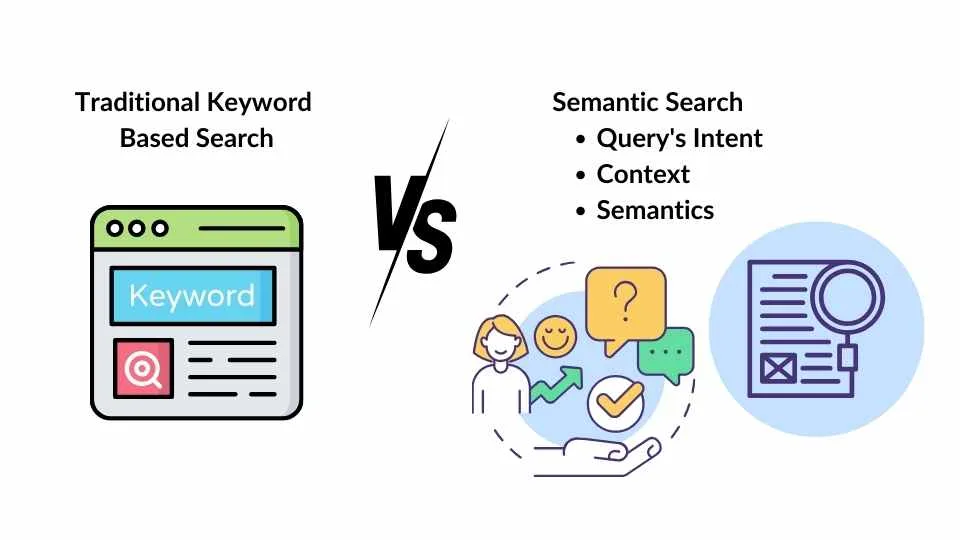
Image source: Spotintelligence.com
4. Mobile-First Indexing: Google now mostly looks at the mobile version of a website instead of the desktop one when ranking sites in search results. That means if your site is mobile-friendly and easy to use on phones and tablets, it'll do better in rankings.
Search Generative Experience (SGE)
SGE is a computer-generated answer that pops up first when you search for something. It makes searching easier because it gives you straight-up answers. Plus, it has images and a way to chat with it. This is what it looks like in a real example when asked what a generative search is.
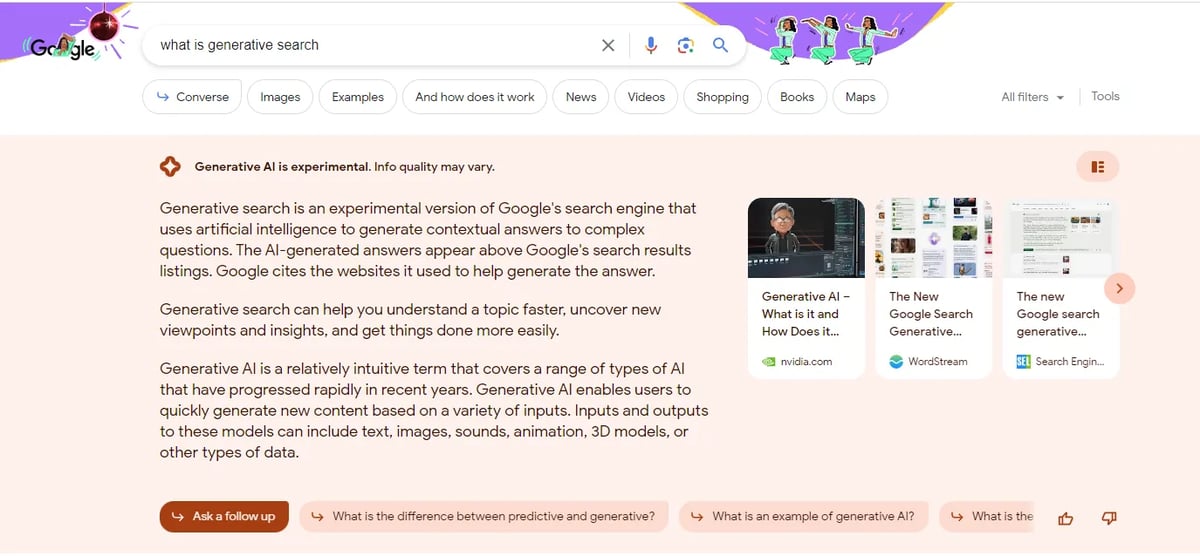
Image source: Medium.com
This new thing is changing the way we use search engines. So, we gotta change how we make our websites good for it.
Tailoring Content for SGE:
When you're tailoring content for SGE, you gotta make sure it's easy for people to find. That means making good content that people care about. And don't forget to make it work for all kinds of searches, like when people talk on their phones or want quick answers using keywords. If you know what people are looking for, you can make your content relevant to the people you're trying to reach. And that's what makes searching a whole lot better for everyone. It doesn’t matter if you want to promote your B2E solutions or your blogging website tailoring your content for SGE will ensure that your message resonates with your audience.
The Role of Artificial Intelligence in SGE:
AI is a really big deal for SGE. It helps us understand what users seek and gives them personalized results. By looking at lots of data and finding patterns, AI can improve search by suggesting more accurate and relevant stuff. Plus, AI can help small businesses reach and connect with potential customers through personalized content and targeted search optimization.
Zero-Click Searches
Do you know when you search for something, the answer just pops up on the screen without even having to click on a website? That's called a Zero-Click Search, and it's a thing now. I am sure you’ve seen it and tested it out already:
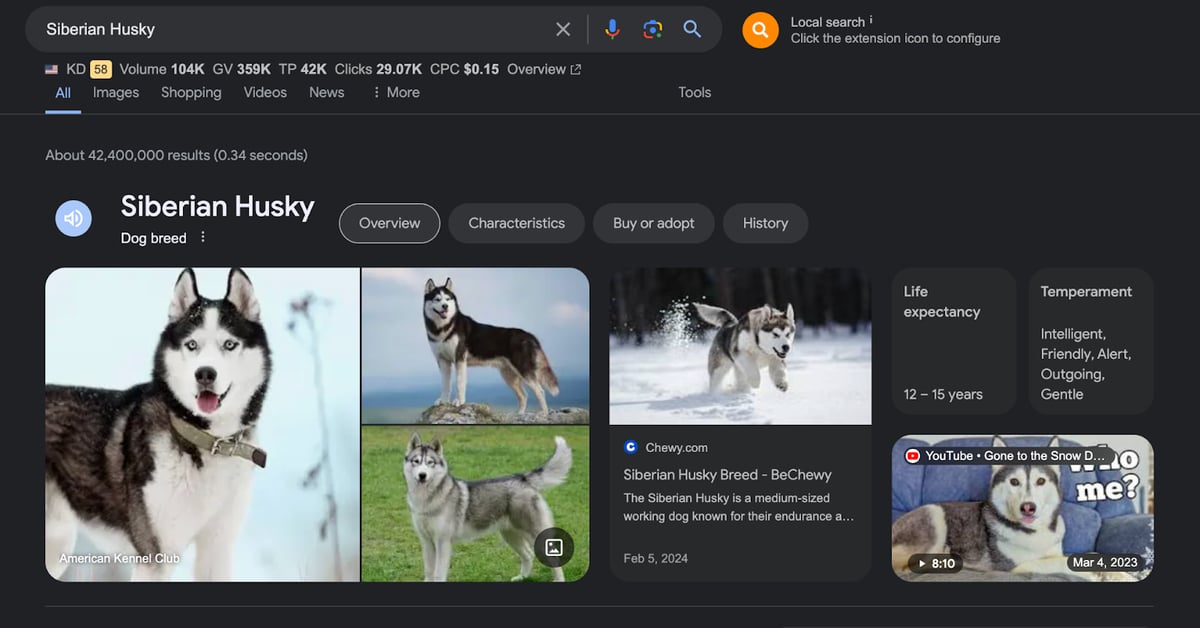
Image source: Screenshot by the author
It looks like search engines are getting smarter, and we're getting lazier. Thanks to featured snippets and knowledge panels, we can get all the necessary info without lifting a finger (or clicking a link). The bad news is that many searches no longer lead to website visits. This can be tough for businesses that rely on search traffic.
And it seems like Zero-Click searches aren't going anywhere. As Semrush research says, 57% of people on their phones just type in a search and find what they need without clicking on anything else and are satisfied with Zero-Click searches.
Minimizing the Impact of Zero-Click Searches
So, even though zero-click searches can be a bit harmful for businesses to increase traffic and conversions, they can still do some things to make sure they don't get lost in search results:
1. Optimize for Featured Snippets:
Find the keywords and topics to get you featured on the search results. Ensure your content stands out and answers common questions quickly and effectively. This will boost your chances of getting featured in those fancy featured snippets!
2. Create Compelling Meta Descriptions:
Make sure your meta descriptions are super catchy to get people to click on your site, even though there are quick answers on the search page. Use strong words, tell people what to do, and highlight what makes your listing special to stand out and get clicks.
3. Diversify Traffic Sources:
Try not to rely too much on organic search. Instead, mix it up by getting traffic from other places like social media, emails, and paid ads. Be everywhere online so you can reach and connect with the people you want to reach. Once you find your customer, consider doing outreach using cold email tools.
By using these tricks, businesses can reduce the effect of zero-click searches and keep showing up and connecting with their audience as search habits change.
E-E-A-T (Experience, Expertise, Authoritativeness, and Trustworthiness)
The E-E-A-T framework is significant in SEO because search engines, like Google, prioritize high-quality content that shows expertise, authoritativeness, and trustworthiness. Websites and content demonstrating strong E-E-A-T signals are more likely to rank higher in search results and attract organic traffic.
Establishing Content Authority
To become an expert in your field, create good content that covers your audience's wants. Make sure to write in-depth articles, guides, and useful resources that give helpful advice and a fresh point of view on your topic.
Practical Steps for E-E-A-T
To become the go-to person in your field, just follow these easy steps:
1. Identify Your Niche:
Figure out your niche and target audience based on what you're good at, what you like, and what people want. Dig to know what your audience needs, struggles with, and likes within your chosen niche.
2. Conduct Keyword Research:
Look for long-tail keywords and specific topics that lots of people are searching for but not many people are competing for. This will help you appear more in search results and ensure you're relevant to your audience.
3. Create High-Quality Content:
Create interesting and helpful content that talks about what your audience cares about. Use facts, trends, and customer feedback to help you make your content relatable and useful. Don't forget to enhance its appeal by incorporating captivating photos and creating photos that resonate with your audience.
4. Build Backlinks and References:
Get backlinks and mentions from other sites and sources in your field to boost your domain rating and show up more in search results. Collaborate with other bloggers and make connections to get your name out there.
Follow these easy steps and keep sharing great content to become an expert. This will help you become a popular source and increase visitors, interactions, and chances to grow.
Successful E-E-A-T Implementation:
1. Healthline:
Healthline is a trusted source of health information that demonstrates expertise by having medical professionals working for them and subject experts who write and review content. Their articles are easy-to-read, well-researched, and regularly updated, earning them authority and trust in the health and wellness niche. No wonder they have more than 11.4 million pages referring to them.
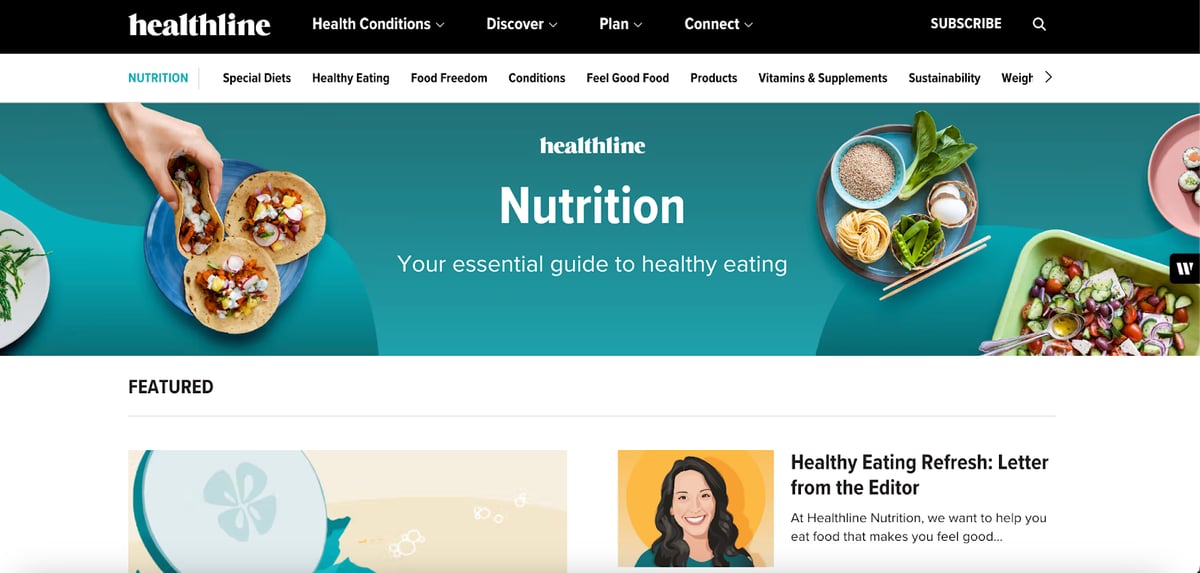
Image source: Healthline.com
2. Neil Patel:
Neil Patel is a total pro at digital marketing. He shares his wisdom and coolness on his blog, podcast, and online courses. He always gives amazing tips, tricks, and real-life examples to show how much he knows about digital marketing. More than 9 million people visit his blog monthly, proving he is a great example of the E-E-A-T concept.
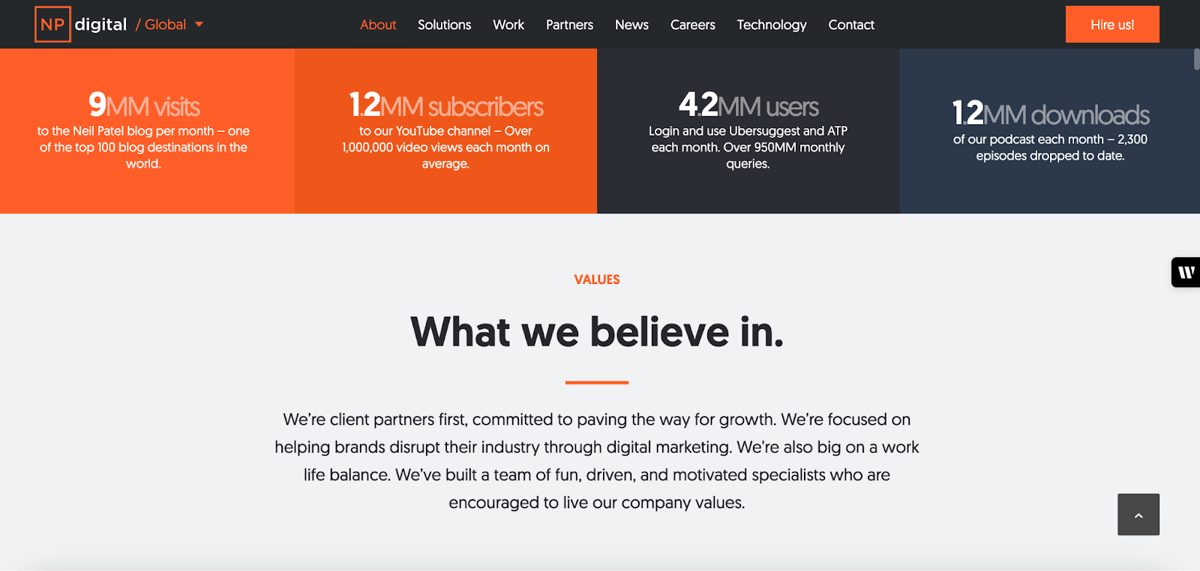
Image source: npdigital.com
Conclusion
In conclusion, SEO in 2024 is changing quickly because of new technology and how people use the internet. Instead of just keywords, it's all about making sure your website is relevant, user-friendly, and has stuff personalized for your audience. If you want your business to do well in search results, you gotta make sure your site works well on mobile, shows up in zero-click searches, and follows the E-E-A-T thing. It's super important for marketers to keep up with these changes so they can connect with their audience in the online world that's always changing.


